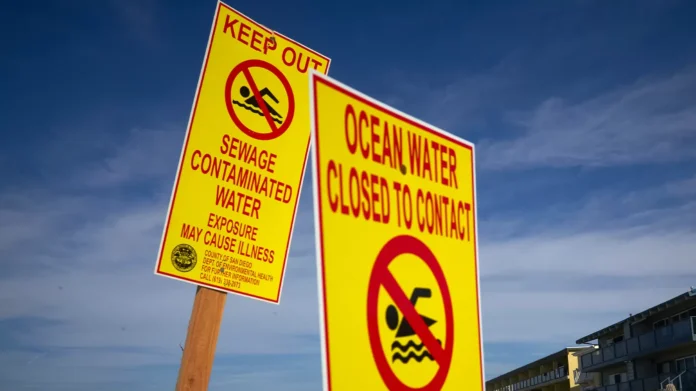Congress has taken a major step towards addressing a long-standing environmental crisis by tripling the funds allocated for cross-border sewage clean-up. The move comes as part of the $1.2 trillion spending bill approved at the eleventh hour this weekend, which was subsequently signed by President Biden on Saturday. This significant development marks a crucial milestone in the efforts to protect the environment and public health in the border region.
The package includes a total of $156 million in the construction budget of the International Boundary and Water Commission (IBWC), a binational organization responsible for managing water resources along the U.S.-Mexico border. This funding will be used to upgrade and modernize the aging infrastructure that has been unable to keep up with the increasing demands of the region.
For years, the border region has been plagued by a sewage crisis caused by the inadequate treatment and disposal of wastewater from cities in Mexico. As a result, millions of gallons of untreated sewage have been flowing into the Tijuana River, which then makes its way into the United States. This has not only caused severe environmental damage but has also posed a significant health risk to the communities living in the area.
The situation has been a cause for concern for both countries, and efforts to address it have been ongoing. However, the lack of adequate funding has been a major obstacle in making any significant progress. The previous administration’s budget cuts had further exacerbated the situation, leaving the IBWC with limited resources to tackle the issue effectively.
But with the recent increase in funding, the IBWC will now be able to undertake crucial projects to improve the sewage infrastructure in the border region. This includes the construction of new wastewater treatment plants, upgrades to existing facilities, and the implementation of new technologies to better manage and monitor the flow of sewage.
This investment is not only crucial for the protection of the environment but also for the health and well-being of the communities living in the area. The constant exposure to raw sewage has had severe health consequences for the residents, including respiratory and gastrointestinal illnesses. With the new and improved infrastructure, the risk of these health hazards will be significantly reduced, providing much-needed relief to the affected communities.
Moreover, the increased funding also reflects the commitment of the Biden administration towards addressing environmental issues and promoting public health. The President has made it clear that protecting the environment and tackling climate change are top priorities for his administration. This move to triple the funds for cross-border sewage clean-up is a testament to that commitment.
The impact of this decision will extend beyond the border region and have a positive ripple effect on the entire country. The Tijuana River flows into the Pacific Ocean, and the pollution caused by the sewage has been affecting the marine life and ecosystems in the area. By addressing this issue, we are not only protecting our own communities but also preserving the natural beauty and resources of our country.
In addition to the environmental and health benefits, this increased funding will also have a positive economic impact. The border region is a vital hub for trade and commerce, and the constant flow of untreated sewage has been a deterrent for businesses and investors. With improved sewage infrastructure, the region will become more attractive for economic development, creating new job opportunities and boosting the local economy.
In conclusion, Congress’s decision to triple the funds for cross-border sewage clean-up is a significant step towards addressing a long-standing crisis. It reflects a strong commitment towards protecting the environment, promoting public health, and driving economic growth. This investment will have a positive impact on both sides of the border and is a crucial step towards building a cleaner and healthier future for all. Let us hope that this is just the beginning of many more positive developments to come in our efforts to protect the environment and promote sustainable living.

